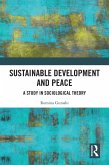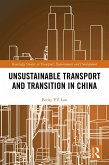The Oxford Handbook of Energy and Society (eBook, PDF)
Redaktion: Davidson, Debra J.; Gross, Matthias


Alle Infos zum eBook verschenken

The Oxford Handbook of Energy and Society (eBook, PDF)
Redaktion: Davidson, Debra J.; Gross, Matthias
- Format: PDF
- Merkliste
- Auf die Merkliste
- Bewerten Bewerten
- Teilen
- Produkt teilen
- Produkterinnerung
- Produkterinnerung

Hier können Sie sich einloggen

Bitte loggen Sie sich zunächst in Ihr Kundenkonto ein oder registrieren Sie sich bei bücher.de, um das eBook-Abo tolino select nutzen zu können.
The Oxford Handbook of Energy and Society presents an overview of this expanding area that has evolved dramatically over the past decade, away from one largely dominated by structural, political economic treatments on the one hand, and social-psychological studies of individual-level attitudes and behaviors on the other, toward a far more conceptually and methodologically rich and exciting field that brings in, for example, social practices, system complexity, risk theory, social studies of science, and social movements theories. This volume seeks to capture the variety of scales and methods,…mehr
- Geräte: PC
- mit Kopierschutz
- eBook Hilfe
- Größe: 27.68MB
![New Urban Spaces (eBook, PDF) New Urban Spaces (eBook, PDF)]() Neil BrennerNew Urban Spaces (eBook, PDF)16,95 €
Neil BrennerNew Urban Spaces (eBook, PDF)16,95 €![Concrete Jungles (eBook, PDF) Concrete Jungles (eBook, PDF)]() Rivke JaffeConcrete Jungles (eBook, PDF)24,95 €
Rivke JaffeConcrete Jungles (eBook, PDF)24,95 €![The Global Environmental Crisis (eBook, PDF) The Global Environmental Crisis (eBook, PDF)]() John LieThe Global Environmental Crisis (eBook, PDF)38,95 €
John LieThe Global Environmental Crisis (eBook, PDF)38,95 €![Feeling Climate Change (eBook, PDF) Feeling Climate Change (eBook, PDF)]() Debra J. DavidsonFeeling Climate Change (eBook, PDF)37,95 €
Debra J. DavidsonFeeling Climate Change (eBook, PDF)37,95 €![Action Research for Sustainability (eBook, PDF) Action Research for Sustainability (eBook, PDF)]() Jonas EgmoseAction Research for Sustainability (eBook, PDF)41,95 €
Jonas EgmoseAction Research for Sustainability (eBook, PDF)41,95 €![Sustainable Development and Peace (eBook, PDF) Sustainable Development and Peace (eBook, PDF)]() Romina GurashiSustainable Development and Peace (eBook, PDF)41,95 €
Romina GurashiSustainable Development and Peace (eBook, PDF)41,95 €![Unsustainable Transport and Transition in China (eBook, PDF) Unsustainable Transport and Transition in China (eBook, PDF)]() Becky Py LooUnsustainable Transport and Transition in China (eBook, PDF)43,95 €
Becky Py LooUnsustainable Transport and Transition in China (eBook, PDF)43,95 €-
-
-
Dieser Download kann aus rechtlichen Gründen nur mit Rechnungsadresse in A, B, BG, CY, CZ, D, DK, EW, E, FIN, F, GR, HR, H, IRL, I, LT, L, LR, M, NL, PL, P, R, S, SLO, SK ausgeliefert werden.
- Produktdetails
- Verlag: Oxford University Press
- Seitenzahl: 752
- Erscheinungstermin: 11. Juli 2018
- Englisch
- ISBN-13: 9780190842611
- Artikelnr.: 54582809
- Verlag: Oxford University Press
- Seitenzahl: 752
- Erscheinungstermin: 11. Juli 2018
- Englisch
- ISBN-13: 9780190842611
- Artikelnr.: 54582809
- Herstellerkennzeichnung Die Herstellerinformationen sind derzeit nicht verfügbar.
Contributions
* 1. A Time of Change, a Time for Change: Energy-Society Relations in
the 21st Century
* Debra J. Davidson and Matthias Gross
* 2. Energy, Climate Change, and Global Governance: The 2015 Paris
Agreement in Perspective
* John Vogler
* 3.Energy Consumption as Part of Social Practices: The Alternative
Approach of Practice Theory
* Ana Horta
* 4. Analyzing the Socio-Technical Transformation of Energy Systems:
The Concept of 'Sustainability Transitions'
* Harald Rohracher
* Part II. Structural/Political-Economic Perspectives: The Persistent
Material and Geopolitical Relevance of Fossil Fuels
* 5. National Energy Signatures: Energetics, Money, and the Structure
of the Global System
* Jalel Sager
* 6. Energy Markets and Trading
* David Mares
* 7. Raw Materialism and Socioeconomic Change in the Coal Industry
* Paul S. Ciccantell and Paul K. Gellert
* 8. The International Political Economy of Eastern European Energy
Security: Russia, Ukraine, and the EU
* Jack D. Sharples
* Part III. Where the Rubber Hits the Road: Consumption Dynamics
* 9. Energy Consumption Trends Across the Globe
* Richard York
* 10. Shifts in Energy Consumption Driven by Urbanization
* Perry Sadorsky
* 11. Theorizing the Behavioral Dimension of Energy Consumption: Energy
Efficiency and the Value-Action Gap
* Marilyn A. Brown and Benjamin K. Sovacool
* 12. Energy Cultures as Sociomaterial Orders of Energy
* Thomas Pfister and Martin Schweighofer
* 13. The Limits of Household Change: Structural Influences over
Individual Consumption
* Janet A. Lorenzen
* Part IV. Is Energy a Human Right? Perspectives on Energy Equity, and
Energy Poverty
* 14. Decreasing Supplies, Increasing Risks in Oil Development
* Christine Shearer
* 15. Industrializing Countries as the New Energy Consumers
* Paulo Manduca, Mauro Berni, Iure Paiva, and José Alexandre Hage
* 16. Energy Poverty, Energy Equity in a World of High Demand and Low
Supply
* Karl-Michael Brunner, Sylvia Mandl, and Harriet Thomson
* 17. Energy Poverty and Climate Change: Elements to Debate
* Marcio Giannini Pereira, Neilton Fidelis da Silva, and Marcos A.V.
Freitas
* Part V. Energy and Publics
* 18. Local Responses to Renewable Energy Development
* Ana Delicado
* 19. User Innovation and Peer Assistance in Small-Scale Renewable
Energy Technologies
* Sampsa Hyysalo and Jouni Juntunen
* 20. The Role of Media Influence in Shaping Public Energy Dialogues
* Aleksandra Wagner
* Part VI. Energy (Re)takes Center-Stage in Politics and Motivates
Shifts in Governance
* 21. Social Movements and Energy
* Ion Bogdan Vasi
* 22. Nightmares and Dreams: Contested Framing of Unconventional Fossil
Fuels
* Jennifer Dodge
* 23. Oil Opposition: Creating Friction in Energy Politics
* Mark CJ Stoddart, Jillian Rene Smith, and Paula Graham
* 24. The Local at the Forefront of Energy Transition: The Example of
the Development of Renewable Electricity in Germany and Sweden
* Cyria Emelianoff
* Part VII. Emerging Trends with the Potential to Generate Significant
Shifts in the Energy Society Relationship
* 25. Are We on the Cusp of a Global Renewable Energy Transition?
* Sybille Roehrkasten
* 26. Technological Optimism in Climate Mitigation: The Case of Carbon
Capture and Storage
* Jennie C. Stephens and Nils Markusson
* 27. Exnovation as a Necessary Factor in Successful Energy Transitions
* Martin David
* 28. In Closing: From 'energy' to 'Energy'
* Matthias Gross and Debra J. Davidson
Contributions
* 1. A Time of Change, a Time for Change: Energy-Society Relations in
the 21st Century
* Debra J. Davidson and Matthias Gross
* 2. Energy, Climate Change, and Global Governance: The 2015 Paris
Agreement in Perspective
* John Vogler
* 3.Energy Consumption as Part of Social Practices: The Alternative
Approach of Practice Theory
* Ana Horta
* 4. Analyzing the Socio-Technical Transformation of Energy Systems:
The Concept of 'Sustainability Transitions'
* Harald Rohracher
* Part II. Structural/Political-Economic Perspectives: The Persistent
Material and Geopolitical Relevance of Fossil Fuels
* 5. National Energy Signatures: Energetics, Money, and the Structure
of the Global System
* Jalel Sager
* 6. Energy Markets and Trading
* David Mares
* 7. Raw Materialism and Socioeconomic Change in the Coal Industry
* Paul S. Ciccantell and Paul K. Gellert
* 8. The International Political Economy of Eastern European Energy
Security: Russia, Ukraine, and the EU
* Jack D. Sharples
* Part III. Where the Rubber Hits the Road: Consumption Dynamics
* 9. Energy Consumption Trends Across the Globe
* Richard York
* 10. Shifts in Energy Consumption Driven by Urbanization
* Perry Sadorsky
* 11. Theorizing the Behavioral Dimension of Energy Consumption: Energy
Efficiency and the Value-Action Gap
* Marilyn A. Brown and Benjamin K. Sovacool
* 12. Energy Cultures as Sociomaterial Orders of Energy
* Thomas Pfister and Martin Schweighofer
* 13. The Limits of Household Change: Structural Influences over
Individual Consumption
* Janet A. Lorenzen
* Part IV. Is Energy a Human Right? Perspectives on Energy Equity, and
Energy Poverty
* 14. Decreasing Supplies, Increasing Risks in Oil Development
* Christine Shearer
* 15. Industrializing Countries as the New Energy Consumers
* Paulo Manduca, Mauro Berni, Iure Paiva, and José Alexandre Hage
* 16. Energy Poverty, Energy Equity in a World of High Demand and Low
Supply
* Karl-Michael Brunner, Sylvia Mandl, and Harriet Thomson
* 17. Energy Poverty and Climate Change: Elements to Debate
* Marcio Giannini Pereira, Neilton Fidelis da Silva, and Marcos A.V.
Freitas
* Part V. Energy and Publics
* 18. Local Responses to Renewable Energy Development
* Ana Delicado
* 19. User Innovation and Peer Assistance in Small-Scale Renewable
Energy Technologies
* Sampsa Hyysalo and Jouni Juntunen
* 20. The Role of Media Influence in Shaping Public Energy Dialogues
* Aleksandra Wagner
* Part VI. Energy (Re)takes Center-Stage in Politics and Motivates
Shifts in Governance
* 21. Social Movements and Energy
* Ion Bogdan Vasi
* 22. Nightmares and Dreams: Contested Framing of Unconventional Fossil
Fuels
* Jennifer Dodge
* 23. Oil Opposition: Creating Friction in Energy Politics
* Mark CJ Stoddart, Jillian Rene Smith, and Paula Graham
* 24. The Local at the Forefront of Energy Transition: The Example of
the Development of Renewable Electricity in Germany and Sweden
* Cyria Emelianoff
* Part VII. Emerging Trends with the Potential to Generate Significant
Shifts in the Energy Society Relationship
* 25. Are We on the Cusp of a Global Renewable Energy Transition?
* Sybille Roehrkasten
* 26. Technological Optimism in Climate Mitigation: The Case of Carbon
Capture and Storage
* Jennie C. Stephens and Nils Markusson
* 27. Exnovation as a Necessary Factor in Successful Energy Transitions
* Martin David
* 28. In Closing: From 'energy' to 'Energy'
* Matthias Gross and Debra J. Davidson







